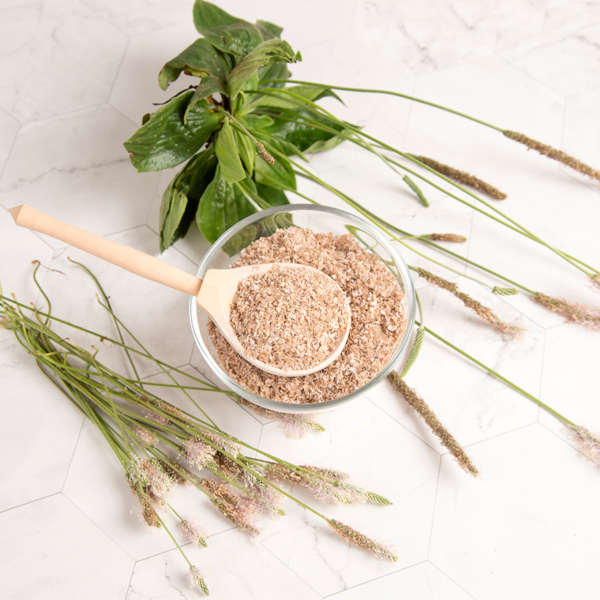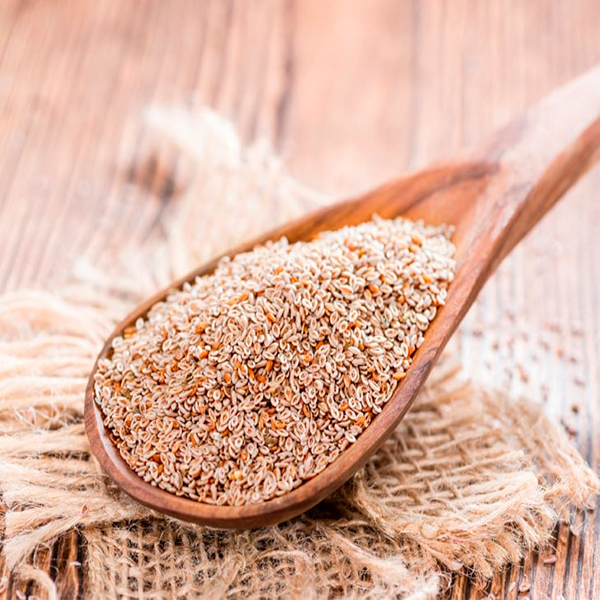
Psyllium Husks: The Natural Solution for Constipation
Constipation is a common issue affecting people of all ages and lifestyles. It can be caused by low-fiber diets, sedentary habits, stress, or even certain medications. If you're looking for a natural, effective, and safe remedy, psyllium is one of the best allies for regulating bowel movements and improving digestive health.
What is psyllium?
Psyllium, also known as blond plantain or ispaghula, is a soluble fiber obtained from the husk of the seeds of Plantago ovata Forssk., an herbaceous plant from the Plantaginaceae family. Native to southwest Asia, it is widely cultivated for its high content of mucilage, polysaccharides with exceptional water-retention capacity.
Thanks to this property, psyllium forms a viscous gel when in contact with liquids, increasing the volume and hydration of the stool, and naturally promoting bowel transit. Its mode of action improves the frequency and consistency of bowel movements, making it one of the most studied and recommended plant-based food supplements for functional constipation.
Among the approximately 200 species within the Plantago genus found around the world, Plantago ovata is the variety with the most clinical applications due to its proven efficacy in regulating intestinal transit and improving gut microbiota.
How does psyllium work in the intestine?
The secret of psyllium lies in its high content of mucilage and soluble fiber. Mucilage are polysaccharides that absorb water efficiently, forming a gel-like substance in the gut that offers the following benefits:
- Increases stool volume and weight.
- Softens stool texture, easing evacuation.
- Stimulates intestinal peristalsis (the natural muscle contractions that move stool through the intestines).
For this reason, psyllium is an excellent option for constipation, especially for occasional constipation or in cases involving hemorrhoids.

How to take psyllium for constipation?
Psyllium supplements are commonly available in three formats: powder, capsules, and seed husks. The powder is ideal for those who prefer mixing it with water or juice, allowing easy dosage adjustment. Capsules offer a more convenient option for those who want to avoid the taste or texture of psyllium. Finally, seed husks are the most natural and least processed form, preserving the mucilaginous fiber responsible for its benefits on bowel movements. Each format suits different preferences, but all deliver the natural effectiveness of psyllium against constipation.
It’s crucial to always take psyllium with plenty of water, as its absorption capacity is key to its effectiveness.
A typical dose ranges from 5 to 7 grams per day, divided into one or more servings, preferably before meals. However, it's always advisable to follow specific usage recommendations.
Tips for safe psyllium consumption:
First, drink enough water—at least a full glass with each dose. Secondly, do not consume it dry: it must always be mixed with liquid to avoid esophageal or intestinal blockage. Lastly, consult a healthcare professional if you have a serious intestinal condition or are taking medications.
Does psyllium have side effects?
Psyllium is well tolerated by most people. However, if not taken with enough water, it may initially cause gas or bloating, a feeling of heaviness, and in very rare cases, intestinal blockage. That’s why it's essential to follow the usage instructions and stay properly hydrated.

What does science say about psyllium?
Psyllium (Plantago ovata) is one of the most extensively studied dietary supplements in the field of digestive and metabolic health. Its effectiveness is not only known through traditional use but has also been backed by numerous high-quality scientific studies.
Psyllium and intestinal transit
Various clinical trials have shown that regular consumption of psyllium is highly effective in increasing the frequency and volume of bowel movements, especially in people with chronic constipation. As a soluble fiber, psyllium absorbs water in the intestine, forming a gel that supports bowel movement and evacuation. A meta-analysis published in *Alimentary Pharmacology & Therapeutics* demonstrated that psyllium significantly increases bowel movement frequency, with 75% of participants achieving at least one additional complete spontaneous evacuation per week.
The study aimed to compare the efficacy and tolerability of a mixed soluble/insoluble fiber against psyllium in patients with functional constipation, using a randomized, double-blind, controlled design.
Methods
The study included 72 patients diagnosed with constipation according to the Rome III criteria. Participants were divided into two groups:
- Mixed fiber group (n=40)
- Psyllium group (n=32) (two subjects withdrew from the study)
Each participant received a 5 g dose of fiber twice daily (b.i.d.) for 4 weeks. A bowel movement diary was used to assess daily symptoms and intestinal habits.
Response criteria
A patient was considered responsive to the treatment if they had at least one additional complete spontaneous bowel movement per week above baseline for at least 2 of the 4 weeks of the study.
Secondary outcomes
In addition to the number of evacuations, the study evaluated stool consistency (according to the Bristol Stool Scale), satisfaction with bowel function, effort required for defecation, associated symptoms such as gas and abdominal bloating, taste and solubility of the supplement, and impact on quality of life (QoL).
Study results
The study showed that both the mixed fiber and psyllium significantly increased the number of complete bowel movements per week compared to baseline, with no significant differences between the treatments. The responder rate was identical in both groups, with 75% efficacy, confirming that both options are equally effective for treating constipation.
Furthermore, improvements were observed in stool consistency, reduced straining during defecation, and decreased abdominal bloating in patients treated with both types of fiber. A positive impact on quality of life was also reported, with significant improvements in perceived intestinal well-being.
Final conclusion of the study
The results indicate that both mixed fiber and psyllium are effective in improving constipation and enhancing patients’ quality of life. Both treatments increased bowel movement frequency, improved stool consistency, and reduced straining, positioning them as safe and effective options for managing chronic constipation.
Therefore, psyllium remains an equally effective and well-tolerated alternative, reinforcing its role as one of the most widely used fibers for regulating intestinal transit.
Where to buy high-quality organic psyllium?
At ANASTORE, we offer a premium option: organic psyllium seed husks carefully selected. Our husks come in convenient single-dose sachets, with a pleasant lemon flavor, and are:
- Free of excipients.
- Non-GMO and pesticide-free.
- Certified organic.
Each daily dose provides 7 g of psyllium husks—ideal for those seeking a natural, effective, and body-friendly digestive aid.

